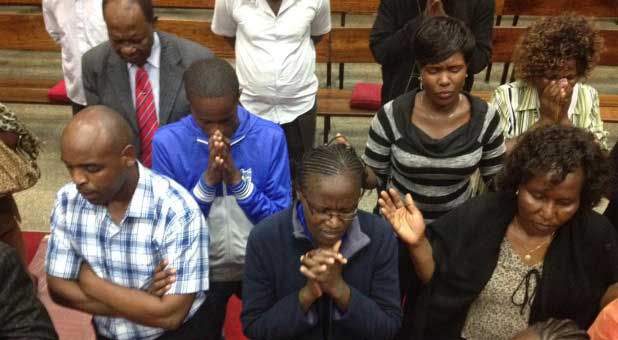Last Sunday I attended both morning services at Deliverance Church in the Kasarani district of Nairobi, Kenya. I was dreading speaking at 8 a.m. because early services in the United States are sparsley attended and the energy levels tend to be weak. But this is not the case in Africa.
When the worship began, ushers were busy urging congregants to move closer together so they could pack people into seats. By the time pastor Jimmy Kimani greeted his flock, people were sitting or standing outside—even though there are more than 1,500 chairs in the main sanctuary. Latecomers have to wait until children are dismissed to their morning classes.
Welcome to Kenya, where churches are overflowing and where missionary-minded leaders are planting new congregations weekly. A study done by the Pew Charitable Trust two years ago confirmed that Christian faith in Africa is growing exponentially. In 1910, Christians made up 9 percent of the population of sub-Saharan Africa; today the number has jumped to 63 percent. The study noted that Nigeria now has more Protestants than Germany, where the Protestant Reformation began.
I know the African church faces big challenges. I wrote last week about the devastating effects of the prosperity gospel in Africa, and readers are still debating that topic in our online forum. But as I watched the people worship at altars in Nairobi and Lilongwe, Malawi, I couldn’t help but say to myself, “I wish we had this in the USA.”
Here are four things we could learn from Africa’s dynamic church:
1. We could learn a lot about spiritual passion. Only 9 percent of people in Malawi have electricity, and most of them live on one dollar a day. Many of the Christians I met in Lilongwe struggle to find money to catch a bus, buy a meal or send their kids to school. Yet dozens of women who attended our meetings two weeks ago trusted God to help them get there—even if it meant they would go without food.
One of my friends in Malawi, a pastor named Peter, took a four-day bus ride to attend a conference in Kenya because he is so passionate about spreading the gospel in his country. We could use some of that desperation on this side of the Atlantic.
2. We could learn about biblical discipleship. While it is true that some African churches have exploited people financially with a selfish prosperity message, many leaders have rejected that emphasis and are working hard to train mature believers. At Deliverance Church in Nairobi, pastor Jimmy Kimani is surrounded by some of the most humble, godly, discerning local leaders I’ve met anywhere in the world. For years Kimani has emphasized the need for small groups and weekend retreats to encourage spiritual growth, and many pastors are following this model.
3. We could learn about defending biblical morality. Last summer during his three-country visit to Africa, President Obama urged lawmakers and members of the clergy to accept same-sex marriage. But Obama’s strategy backfired. Kenya’s President Uhuru Kenyatta, Senegal’s President Macky Sall and several top church leaders rebuked Obama for trying to impose acceptance of homosexuality on a culture that has long disapproved of it. Even though Africans initially cheered Obama’s election in 2008 because of his Kenyan roots, today many are disappointed that he has bought into what they view as an anti-Christian agenda.
“Those who believe in other things, that is their business. We believe in God,” said Deputy President William Ruto during Obama’s visit in July. “President Obama is a powerful man, but we trust in God as it is written in the Bible, that ‘cursed is the man who puts trust in another man.’”
Cardinal John Njue, archbishop of Nairobi and president of the Kenya Episcopal Conference, was more blunt. He told Obama, “Those people who have already ruined their society … let them not become our teachers to tell us where to go. I think we need to act according to our own traditions and our faiths.”
It is the height of Western intellectual pride to think we are the keepers of morality; it is even more reprehensible that Mr. Obama would require African counties to accept his religious views on homosexuality in order to receive U.S. financial aid.
4. We could learn about commitment to Christ in the face of persecution. In September, Muslim extremists in Jos, Nigeria, ordered passengers to get off a bus. They then shot those who identified themselves as Christians. Did you hear about the brutal incident on television? Probably not, because the world yawns or looks away when Christians suffer for their faith.
Persecution has kept Africa’s church strong. I have interviewed Nigerian Christians whose hands and arms were sliced off by knife-wielding Islamic terrorists. I also know African pastors who have been directly opposed by witchdoctors with occult powers. Christians in Africa today are perhaps better equipped to address the reality of Christ’s power in a world that hates the truth of the gospel. They are my heroes, and I intend to learn as much as possible from them.
J. Lee Grady is the former editor of Charisma and the director of the Mordecai Project (themordecaiproject.org). You can follow him on Twitter at @leegrady. He is the author of The Holy Spirit Is Not for Sale and other books.
























